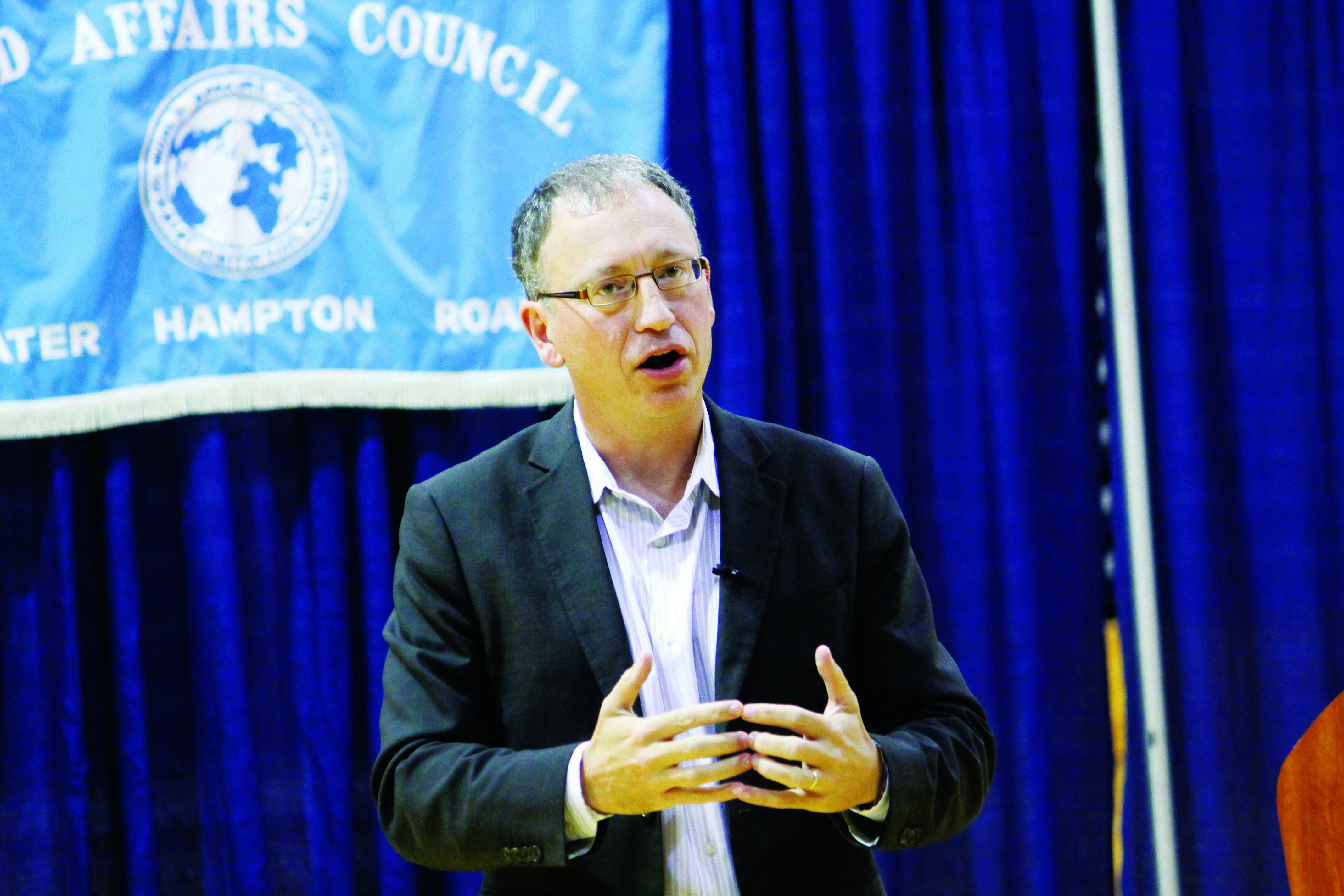Tiya Johnson/Marlin Chronicle
By Jessica Mackey
Virginia Wesleyan College may be located in the Hampton Roads area. However, the interests of the college community extend beyond oceans and state borders. Last week the college welcomed Marc Lynch, Director of the Institute for Middle East Studies at George Washington University, in partnership with the World Affairs Council of the Greater Hampton Roads.
Dr. Lynch’s presentation, entitled “Understanding the Muslim World,” provided a thorough understanding of the international interests and domestic policies concerning the current affairs of the Middle East, especially the rise of the Islamic State, also known as the Islamic State in Syria, or ISIS.
He started by discussing the impact the Arab Spring had on the Middle East region in beginning an international reevaluation of the relationships of the countries in the region.
He discussed the leading factors that contributed to the widespread protests that were referred to as the Arab Spring. In the decade leading up to the protests, degradation of the political institutions in the region was widespread, and the disparities between the rich and poor grew exponentially, causing unrest in the general population because the states had failed to address their citizens’ daily lives, he said.
During the time of the protests, the international community looked to the region with optimism. The prospect of genuine change throughout the region seemed possible. However, as quickly as the protests and revolutions began, the leadership and power structures of the countries quickly reined in their citizens with violence and destruction.
This was shown through the overthrow of the Egyptian government by a military coup. Libya’s state failed completely, despite international intervention, ending in civil war throughout the region. In Yemen, much negotiation with the United Nations was not successful in bringing about a transition to a democratic government.
The failure of these states coupled with the ending of the Iraq war, evidently allowed the Islamic State to grow and prosper in Iraq and Syria. The terrorist organization gains its power from the number of jihadis, the huge number of American weapons left after the war, and enormous revenue due to extortion schemes and the selling of oil, and the large amount of territory they have claimed.
In fact, Dr. Lynch described Syria as the “worst humanitarian and political catastrophe in the 21st century.” The devastating civil war that spread throughout the country has given the country a non-legitimate leader (according to international law standards), left the country with roughly 200,000 people dead (however, no one knows the actual number) and has left the region with over three million registered refugees and over ten million internally displaced individuals.
Although Dr. Lynch had a clear understanding of events leading up to the current political climate in the region, he could not prescribe a clear direction which he thinks the United States of America and the rest of the world should take in trying to correct the instability of power in the Middle East.
Many of the students and faculty that attended the event were thankful and appreciative for the ability to learn about international affairs and expand the relationships the college has with its partners in the area.
“Partnerships with organizations like the World Affairs Council are vital for enhancing experiential learning opportunities on this campus,” said Dr. Aubrey Westfall, assistant professor of political science. “Experiential learning requires students to learn through their own experiences, and partnerships with local organizations helps make these experiences possible, either through providing the actual experiences (i.e., meeting experts, providing internships), or providing a context where our students can start to form their own professional networks.”
“This topic made me think hard about what is going on outside of the United States,” said senior Amanda Mikajlo. “This event gave insight that even people who do not follow the news or current event could understand. This presentation made me think about what the world has come to. Though pessimistic and truthful, it also gave hope as to look at all of the world’s conflicts as a start that will eventually come to an end.”
The sentiment of the campus community is that they hope events like Dr. Lynch’s presentation continue and further enhance the educational benefits for students.
“There are three things I hope students get out of the Dr. Lynch presentation: First, I hope students become better informed through participation in these events. Second, I hope they appreciate the availability of opportunities for enhancing experiential learning right now in our immediate area. And thirdly, I hope they are exposed to organizations that can help them maintain their commitment to learning even after they leave college,” said Westfall.


